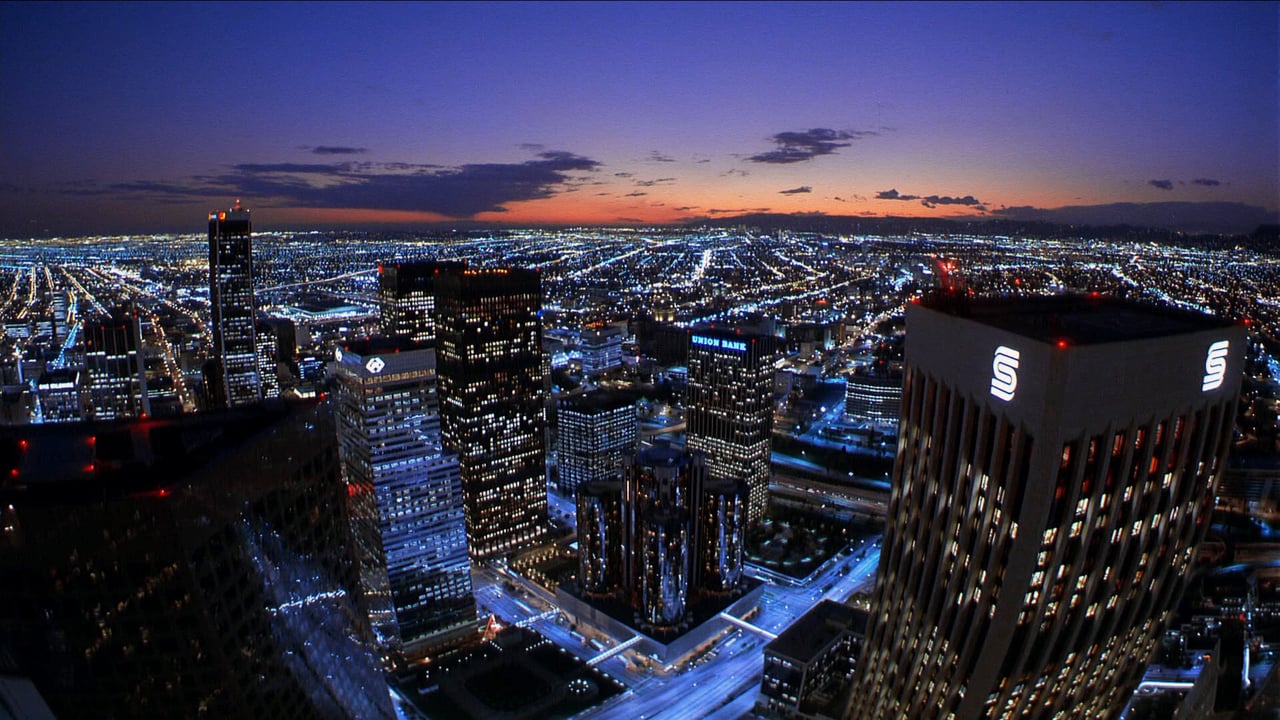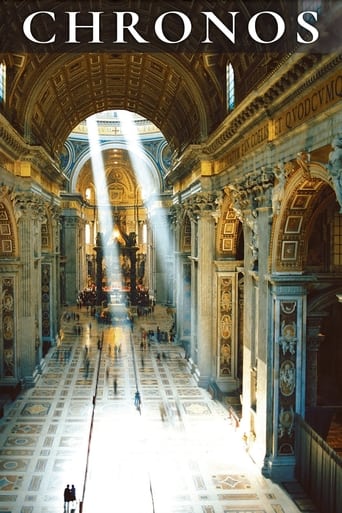

Excellent, a Must See
... View MoreVery interesting film. Was caught on the premise when seeing the trailer but unsure as to what the outcome would be for the showing. As it turns out, it was a very good film.
... View MoreInstead, you get a movie that's enjoyable enough, but leaves you feeling like it could have been much, much more.
... View MoreThe film may be flawed, but its message is not.
... View MoreThis is somewhere between documentary and photography. It has neither a script nor actors, and there is no narrator, no interview, and no still images. This is a moving picture, in the purest sense. The major focus is the time lapse cinematography of Ron Fricke, who also serves as director. That, and the soundtrack by Michael Stearns, is the sum total of "Chronos".There are deeper meanings to some, intended and accidental, but I won't cheapen things by speculating on what those are. The main drive is the battle of slow versus fast, city versus nature. Much of the time lapse goes by at what appears to be the same speed, but what moves blisteringly fast in the city seems to go by without change or notice in nature. Only the slow march of shadows is apparent across rocks and old ruins. These passages are full and heavy with the weight of time. They pull like the moon on the tides, dragging you back into long forgotten history. It comes like a slow, shallow breath between trains hurtling down tracks to uncertain destinations, and the bleeding blur of strangers up escalators.I've watched "Chronos" in many different contexts. It's been a relaxing background to the end of a long, tired day, or the full focus of my attention as I appreciate its depth of artistry. At forty-three minutes, it's neither too long to drag or too short to feel cut off. Each time after watching it, I find myself out of place with the speed of things around me. I feel the need to step back and breathe, to run faster, to walk slower. Somehow, some way, "Chronos" changed the way I see time.
... View MoreSpace, time and matter. While the first might have started at the birth of the universe and the later is created and destroyed everyday, time stands alone. It cannot be undone and if there is anything that can resist time, it is time itself. In this sense time is the most mysterious. Is it even real? Is it only a creation of mankind to explain the beginnings and the ends? In Greek Mythology, Chronos is known to be the god of time. In this sense, Ron Fricke is trying to unite both conceptions of time through vast, open spaces and closed, personal areas. In his film, he tried to put the matter and space in perspective, showing that time had a greater influence.When it came out, Chronos was considered as a very advanced, an "ahead of its time" kind of movie. The ground breaking Koyaanisqatsi was nearly 5 years old. The technical attributes of the movie were far greater than what could be found in popular, conventional cinema. The synthesized music was relatively new to the world and Michael Stearns was already establishing himself as both a leader and a pioneer in the ambient music department, even creating a particular instrument for the film. And of course, when Chronos came out back then, similar movies were hard to find.Needless to say: Chronos relied heavily on the overall technology of 80's.Nowadays, the technical attributes found in Chronos have been beaten by other movies. Music can now be created with complex, yet easy to use programs by using extremely effective computers which can produce an almost infinite number of sounds, effects, etc.. And finally, there are many similar movies nowadays, and we can find time lapse captures everywhere from typical Hollywood movies to televised advertisements.This now leads people to believe that this movie is unoriginal, lacking depth and that the music is not good. As ironic as it sounds, Chronos is slowly being killed by time itself, whether it be real or not. But that does not mean that the movie is now bad today. Of course, there are obstacles that the viewer must surpass in order to view the movie and to think " Let's compare it to other movies in the 80's ".When criticizing this movie, many people will compare it to Baraka ( which was made many years later, must I add ) and automatically point out the obvious: It's always the same areas, the music is always the same, the overall "message" is lacking.Fricke didn't have the budget he had for Baraka. Stearn's music was innovative and fresh at the moment and yes, there is a "message" in Chronos, you just didn't take the "time" to see it.In Baraka, the message concerning spirituality and humanity is easier to understand for a simple reason: Ron Fricke did it on purpose. The most important religions and areas of the world are shown. The whole movie is made in a way to connect with the entire world. In this sense, Baraka is a movie about the Earth and its inhabitants and what is around and beyond it. You will notice that in Baraka there are things you can easily understand and point out while there are others more obscure themes that you might not even notice.Chronos is far more complicated for the viewer. While Baraka is still an experimental film, it is not an abstract film. Chronos is both an experimental and abstract film. In this sense, it is way harder for the viewer to acknowledge Chronos to actually have a meaning and to make something out of it.This shows how Ron Fricke truly is a mastermind when it comes to giving other people the opportunity to come out with their own interpretations of his movies. A short comparison with Geoffrey Reggio ( Fricke's partner ) can be made. While Reggio builds his movies on a specific message which make the viewer think after watching the films, Fricke chooses to make the viewer think while he his still watching. Most viewers will often try to find a meaning to Chronos after watching it or they will try to associate a specific series of scenes.Of course, Chronos is not as good as Baraka. I believe everyone can agree on this. But everyone should all agree that Chronos was some sort of cinematic homework for Fricke. Not only was it his first own film, but he was also stepping on a different kind of path than Reggio's. He actually found his own path, his own style, a cinematic trademark. And for this originality and advance in film, Chronos deserves to be considered as a good movie. Not the best, but one of the good.
... View MoreYou have to listen to the commentary track on the special edition DVD to understand this movie. Many scenes were shot not only in time lapse but also with multiple exposures and multiple frame printing. Because of this we are able to view scenes which are not ordinarily recordable on film in places where artificial lighting is not permitted. This is as close as we will ever get to seeing these places without actually being there.A supplementary featurette also explains the origins of the music and unique instruments which were used to record it.Critics should bear in mind that this movie was shot in 1985 on a shoestring budget with a home made camera at a time when IMAX was in its infancy. As such it is a staggering achievement and a landmark movie in the history of cinematography.
... View MoreThis film is one of the most exquisite films I have ever seen. It is comprised completely of time-lapse and aerial photography, and is a tremendous accomplishment. Highly recommended for anyone interested in time-lapse photography, cinematography, or film making in general.
... View More